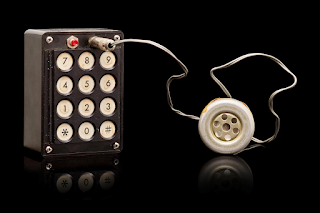3 interesting examples of IT solutions from different decades
3 interesting examples of IT solutions from different decades
1970s - Blue Box
Before Steve Wozniak and Steve Jobs have founded Apple, they invented and sold an illegal phone phreaking device. It was called the 'Blue Box'. The Jobs-Wozniak 'Blue Box' was a world-first digital hacking tool, as all previous such devices used by phreakers had been analog. Phreakers used such devices to deceive the telephone system, make free phone calls anywhere in the world, plus a host of other highly illegal practices.
 |
| The only complete Wozniak-Jobs blue box to have been to public auction was sold for $125,000 in 2017 |
The principle on which it was based is described in book 'Steve Jobs' by Walter Isaacson:
"A hero of the piece was John Draper, a hacker known as Captain Crunch because he had discovered that the sound emitted by the toy whistle that came with the breakfast cereal was the same 2600 Hertz tone used by the phone network's call-routing switches. It could fool the system into allowing a long-distance call to go through without extra charges. The article revealed that other tones that served to route calls could be found in an issue of the Bell System Technical Journal, which AT&T immediately began asking libraries to pull from their shelves."
The business of selling such devices was later shut down by the police. Four years later the pair of Steves went on to set up their second company together: Apple Computer.
1990s - First ever touchscreen phone
The first ever phone that featured a touchscreen was developed by IBM in 1993. It went on sale in 1994 and was featuring a touchscreen, capability of writing emails and a couple of built-in apps, such as calculator and a sketch pad.
 |
| IBM Simon |
2020s - Zero-knowledge proof
In cybersecurity, the less information floating around the better. The fewer companies storing your financial records, the less likely your information will be leaked. Even though there are many ways to reduce data sharing, there are some things services just need to know, right? With the help of the cryptographic method known as “zero-knowledge proof” that’s not always the case.
Zero-knowledge proof is a method by which one person can prove to another person that a given statement is true while the prover avoids conveying any additional information apart from the fact that the statement is indeed true.
References
- W. Isaacson. Steve jobs. 2011
- M. Hanlon. Rare Wozniak-Jobs "blue box" phone phreaking device could fetch $100,000. https://newatlas.com/collectibles/rare-wozniak-jobs-blue-box-phone-phreaking-device-auction/ (30.01.2022)
- R. Smith. IBM created the world's first smartphone 25 years ago. https://www.weforum.org/agenda/2018/03/remembering-first-smartphone-simon-ibm/ (30.01.2022)
- Number of smartphone users. https://www.statista.com/statistics/330695/number-of-smartphone-users-worldwide/ (30.01.2022)
- T. Alameda. Zero Knowledge Proof: how to maintain privacy in a data-based world. https://www.bbva.com/en/zero-knowledge-proof-how-to-maintain-privacy-in-a-data-based-world/ (30.01.2022)
- L.H. Newman. Hacker Lexicon: What Are Zero-Knowledge Proofs? https://www.wired.com/story/zero-knowledge-proofs/ (30.01.2022)


Comments
Post a Comment